Introduction
Geometry package provides API to adapt various geometry data structures such as Boost.Polygon and Boost.Geometry and various specialized geomtric algorithms such as computing area of polygons, conversion of rectilinear polygon to rectangles, etc. It is developed in a generic way to be flexible to different data types either in STL or Boost.
Examples
Custom Geometric Classes
Define custom classes for points and rectangles and use Polygon2Rectangle to convert polygon to rectangles.
See documented version: test/geometry/test_p2r.cpp
#include <iostream>
#include <vector>
#include <list>
#include <set>
using std::cout;
using std::endl;
using std::vector;
using std::list;
using std::set;
{
typedef int value_type;
value_type m_x;
value_type m_y;
value_type const& x() const {return m_x;}
value_type const& y() const {return m_y;}
void x(value_type v) {m_x = v;}
void y(value_type v) {m_y = v;}
};
namespace limbo {
namespace geometry {
template <>
{
typedef Point point_type;
typedef int coordinate_type;
static coordinate_type
get(
const point_type& point,
orientation_2d orient)
{
if (orient == HORIZONTAL)
return point.
x();
else if (orient == VERTICAL) return point.y();
else assert(0);
}
static void set(point_type& point,
orientation_2d orient, coordinate_type value)
{
if (orient == HORIZONTAL) return point.x(value);
else if (orient == VERTICAL) return point.y(value);
else assert(0);
}
static point_type construct(coordinate_type x, coordinate_type y)
{
point_type p;
p.x(x); p.y(y);
return p;
}
};
}}
{
typedef int value_type;
value_type m_xl;
value_type m_yl;
value_type m_xh;
value_type m_yh;
value_type const& xl() const {return m_xl;}
value_type const& yl() const {return m_yl;}
value_type const& xh() const {return m_xh;}
value_type const& yh() const {return m_yh;}
void xl(value_type v) {m_xl = v;}
void yl(value_type v) {m_yl = v;}
void xh(value_type v) {m_xh = v;}
void yh(value_type v) {m_yh = v;}
};
namespace limbo {
namespace geometry {
template <>
{
typedef int coordinate_type;
static coordinate_type
get(
const rectangle_type& rect,
direction_2d dir)
{
switch (dir)
{
case LEFT: return rect.xl();
case BOTTOM: return rect.yl();
case RIGHT: return rect.xh();
case TOP: return rect.yh();
default: assert(0);
}
}
static void set(rectangle_type& rect,
direction_2d dir, coordinate_type value)
{
switch (dir)
{
case LEFT: rect.xl(value); break;
case BOTTOM: rect.yl(value); break;
case RIGHT: rect.xh(value); break;
case TOP: rect.yh(value); break;
default: assert(0);
}
}
static rectangle_type construct(coordinate_type xl, coordinate_type yl, coordinate_type xh, coordinate_type yh)
{
rectangle_type rect;
rect.xl(xl); rect.yl(yl);
rect.xh(xh); rect.yh(yh);
return rect;
}
};
}}
void test1(
string const& filename)
{
vector<Rectangle> vRect;
assert(p2r.read(filename));
assert(p2r());
p2r.print("p2r1.gp");
}
void test2(
string const& filename)
{
vector<Rectangle> vRect;
assert(p2r.read(filename));
assert(p2r());
p2r.print("p2r2.gp");
}
void test3(
string const& filename)
{
vector<Rectangle> vRect;
assert(p2r.read(filename));
assert(p2r());
p2r.print("p2r3.gp");
}
int main(
int argc,
char** argv)
{
if (argc > 1)
{
}
else cout << "at least 1 argument is required" << endl;
return 0;
}
Compiling and running commands (assuming LIMBO_DIR is valid and limbo library has been properly installed)
1 g++ -o test_p2r test_p2r.cpp -I $LIMBO_DIR/include
2 ./test_p2r benchmarks/polygon1.gp
Output drawn with gnuplot
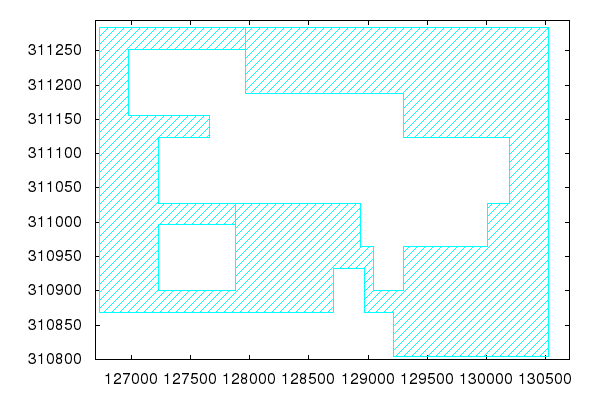
original polygon
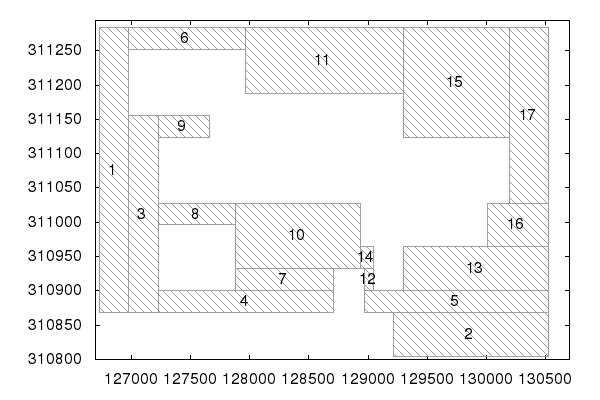
test 1 solution
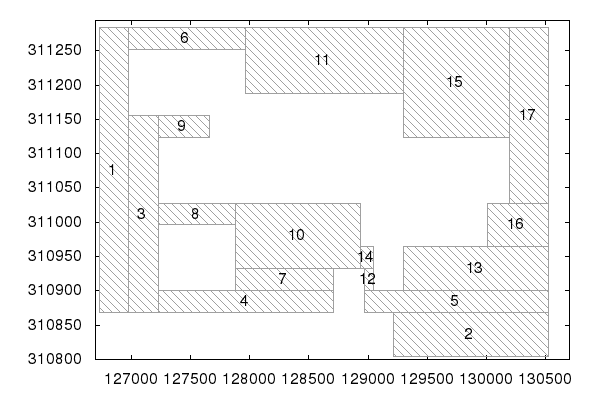
test 2 solution
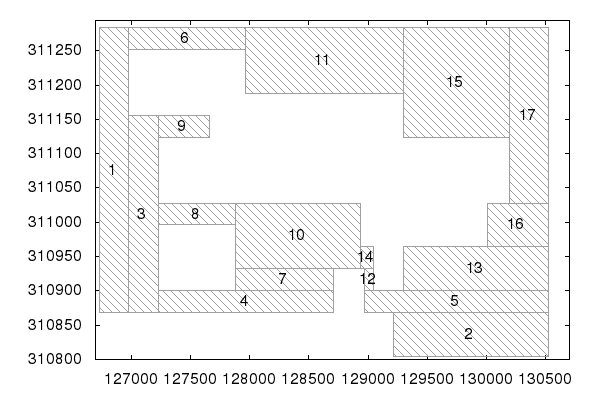
test 3 solution
Boost.Polygon API
Use point and rectangle types in Boost.Polygon.
See documented version: test/geometry/test_boostpolygonapi.cpp
#include <iostream>
#include <string>
#include <vector>
#include <list>
#include <set>
#include <boost/polygon/polygon.hpp>
using std::cout;
using std::endl;
using std::string;
using std::vector;
using std::list;
using std::set;
void test1(
string const& filename)
{
std::vector<gtl::rectangle_data<int> > vRect;
assert(p2r.read(filename));
assert(p2r());
p2r.print("p2r1.gp");
}
void test2(
string const& filename)
{
std::vector<gtl::rectangle_data<int> > vRect;
assert(p2r.read(filename));
assert(p2r());
p2r.print("p2r2.gp");
}
void test3(
string const& filename)
{
std::vector<gtl::rectangle_data<int> > vRect;
assert(p2r.read(filename));
assert(p2r());
p2r.print("p2r3.gp");
}
{
vector<gtl::point_data<int> > vPoint (8);
vPoint[0] = gtl::construct<gtl::point_data<int> >(0, 0);
vPoint[1] = gtl::construct<gtl::point_data<int> >(0, 10);
vPoint[2] = gtl::construct<gtl::point_data<int> >(10, 10);
vPoint[3] = gtl::construct<gtl::point_data<int> >(10, 20);
vPoint[4] = gtl::construct<gtl::point_data<int> >(20, 20);
vPoint[5] = gtl::construct<gtl::point_data<int> >(20, 10);
vPoint[6] = gtl::construct<gtl::point_data<int> >(30, 10);
vPoint[7] = gtl::construct<gtl::point_data<int> >(30, 0);
vector<gtl::rectangle_data<int> > vRectangle;
for (std::size_t i = 0; i != vRectangle.size(); ++i)
{
gtl::rectangle_data<int> const& rect = vRectangle[i];
cout << "(" << gtl::xl(rect) << ", " << gtl::yl(rect) << ", " << gtl::xh(rect) << ", " << gtl::yh(rect) << ")\n";
}
cout << "test 4 passed\n";
}
int main(
int argc,
char** argv)
{
if (argc > 1)
{
}
else cout << "at least 1 argument is required" << endl;
return 0;
}
Compiling and running commands (assuming LIMBO_DIR is valid and limbo library has been properly installed)
1 g++ -o test_boostpolygonapi test_boostpolygonapi.cpp -I $LIMBO_DIR/include -I $BOOST_DIR/include
2 ./test_boostpolygonapi benchmarks/polygon2.gp
Output drawn with gnuplot
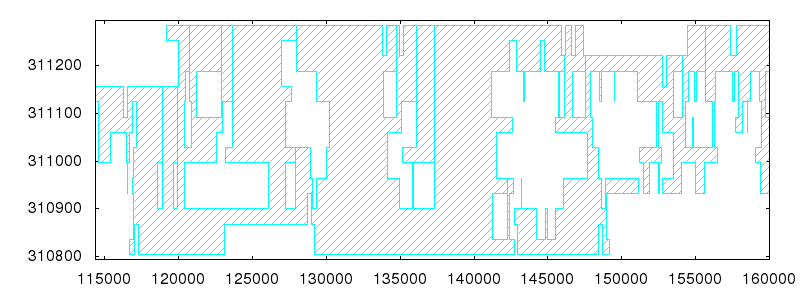
original polygon
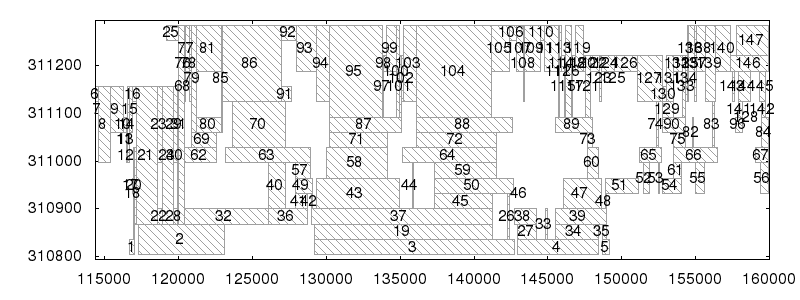
test 1 solution
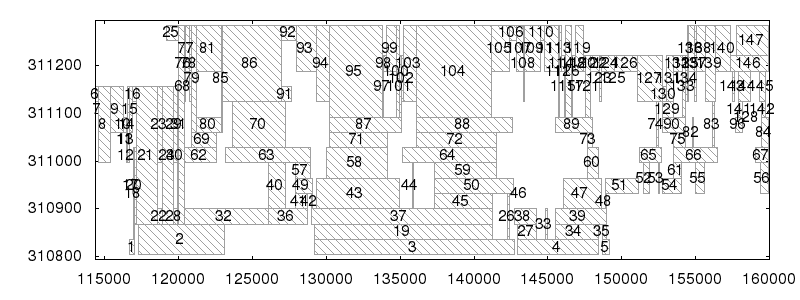
test 2 solution
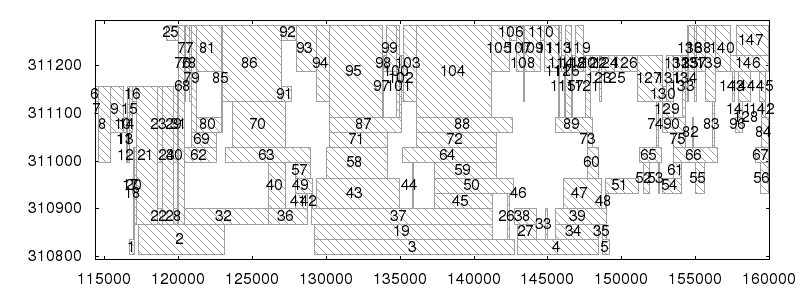
test 3 solution
All Examples
Possible dependencies: Boost.
References








 1.8.8
1.8.8